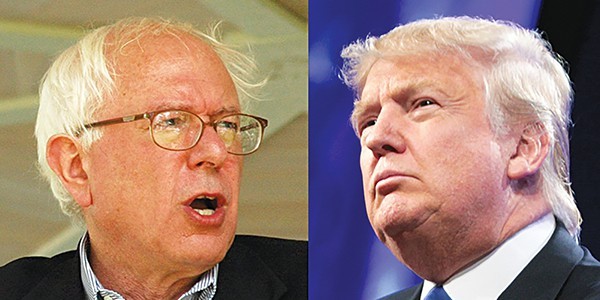Four Weddings and a Funeral was already taken as a movie title, but caterer Ann Barnes says that could also be the title of the book she’s planning to write one day.
“I did four weddings and a funeral on the same day,” she says.
During her almost 50-year career, Barnes has cooked for movie stars, musicians, famous authors, ambassadors, royalty, one archbishop, and five United States presidents.
She’s prepared meals for two (a candlelight engagement party in a park) and for up to 3,000 people (the opening of Wolfchase Galleria in 1997).
“My jaws are still dropping,” Barnes says. “Just wild and wonderful opportunities. One thing led to another.”
In addition to catering, Barnes, who is owner of Corinne’s Very Special Catering (named after her mother, Corinne Batson), owned Just for Lunch restaurant, which had three locations: 4730 Poplar, 4706 Spottswood, and 3092 Poplar Avenue. Her sister Susan Overton, who owned A Very Special Tearoom in Little Rock, Arkansas, was the inspiration for her Just For Lunch restaurants.
A Dignified Start
Born in Little Rock, Barnes initially learned to cook from The Essential New York Times Cookbook, the Neiman Marcus Cookbook, and Better Homes & Gardens New Cookbook. “I never cooked one time until I got married. I got all those for wedding presents.”
Barnes moved to Memphis in 1967. Three years later, she began doing cooking jobs for friends and family for fun. Her criteria has always been: “If it doesn’t look pretty and taste good, I won’t serve it.”
Dixon Gallery and Gardens was where she did her first public catered luncheon. “It was an ordinary lunch — an avocado with shrimp salad and fruit, some good rolls, muffins, and maybe aspic.”
She didn’t realize until the day after the luncheon that she’d cooked for the French ambassador, who was the honoree. “If I’d have known, I would have thrown in an extra strawberry,” she jokes.
“After that I had the good future of cooking for many ambassadors,” she says. For a particular Russian ambassador, Barnes made “ice bowls out of ice with flower petals in them so we could serve borscht. We put a little cream with the beet juice. It looked exactly like Pepto Bismol.”
Fit for a Prince
Among other dignitaries she cooked for was Prince Edward, the Duke of Edinburgh, the youngest son of Queen Elizabeth II. Prince Edward was at an event Barnes catered in Oxford, Mississippi, where she’s done many catering jobs. (She was told she “had done weddings for anyone who had a street named after them in Oxford.”)
The event for Prince Edward featured “an elevated Southern menu,” she says. She remembers making pecan-encrusted catfish. She may have made a “grits cake” (with cooked grits, butter, and cheese). And, she says, she probably served “eggs Creole,” which is made with andouille sausage and eggs with crawfish sauce poured over it.
Barnes and her staff weren’t supposed to speak to Prince Edward. “They told us, ‘Don’t talk to him. He’s very formal.’ Well, he wanted to talk. It was a fancy, seated dinner. He wanted to sample a lot of Southern dishes. He talked to servers. He talked to me.”
The dessert buffet was in another room. They served peach pan pies (aka “fried pies”), bourbon pecan pie, and banana pudding. The buffet also included crème brûlée, but not served in the thin little ramekins like those favored at restaurants, Barnes says with a bit of distaste. They were “served in casserole dishes. Served at the table. The old-fashioned way.”
“The Scotland Yard people said, ‘We’ve been all over the world and this is the best food we ever had,’” she says.
Prince Edward gave her a brass bookmark with a ribbon tied to it. “I thought that was nice.”
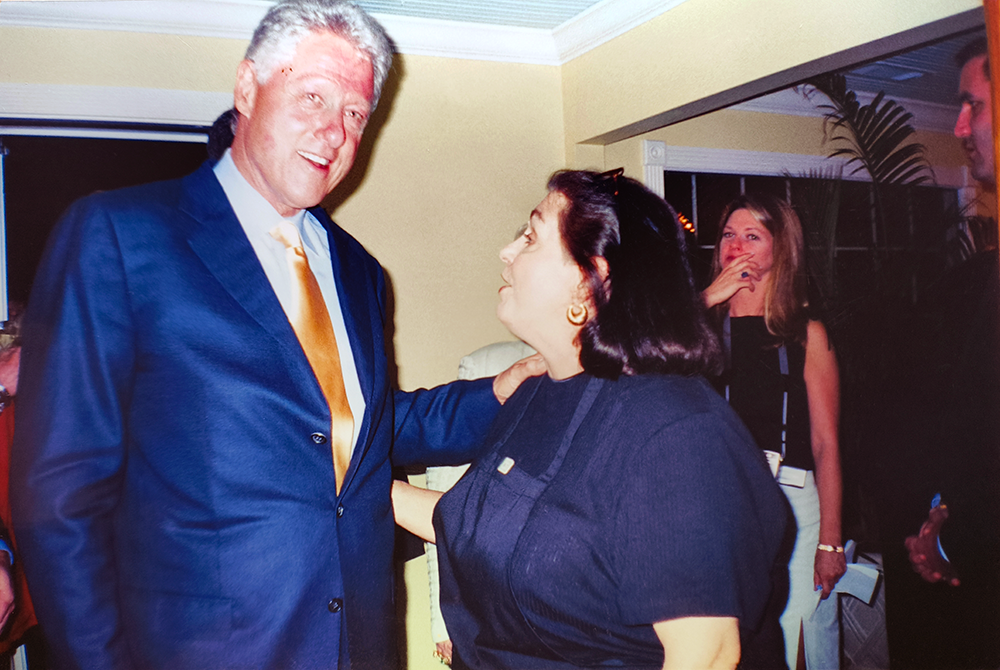
A Presidential Path
Other notables Barnes catered for include Jehan Sadat, wife of Anwar Sadat, then-president of Egypt. She prepared a high tea for her at “an intimate gathering in someone’s home.”
Barnes did a reception for 2,500 people for writer/commentator William F. Buckley Jr., host of TV’s Firing Line. It was to celebrate the episode of the show taped in Oxford, Mississippi. “He was very nice. Kind of very Harvard proper, you know what I mean? Very blue blood.”
One of the show’s guests who attended the dinner was former United States Secretary of State Henry Kissinger. He talked to Barnes like they were old friends. “He took his shoes off. He said he was more comfortable with his shoes off.” He also took the tops off the different little sandwiches on the buffet and looked at them, Barnes says. She asked if there was a problem. “He said, ‘No, no, no. I just wanted to see.’”
Then, she said, “He would politely put them back on and pop them in his mouth.”
Barnes has cooked for former presidents Barack Obama, Jimmy Carter, George H.W. Bush, George W. Bush, and Gerald Ford, but she didn’t get to talk to them like she did Bill Clinton, who was the guest at the home of Gwen and John Montague. He went back in the kitchen and “smiled and waved,” Barnes says. “He looked up at me. I had an apron on. [He said,] ‘What’s going on back here?’ I was trying to look dignified. He took a bite of something as he left the kitchen and said, ‘Good groceries.’”
Meeting and cooking for the Dalai Lama was one of her most cherished memories, Barnes says. “He never quit smiling.”
She made chive dumplings for him — he’s vegetarian. She made flowers out of vegetables as garnishes.
The Dalai Lama’s entourage — “big, burly men” — didn’t use plates at the buffet, Barnes recalls. “They reached into the chafing dishes and scooped it up and ate it. I tried to hand them plates. They said, ‘No, no. It’s good.’”
Chef to Stars
The laundry list of celebrities Barnes has fed includes Marlo Thomas and her husband Phil Donahue, Julie Andrews, Tiger Woods, and race car driver Dale Earnhardt.
She cooked for Sam Shepard and Jessica Lange at Just For Lunch. “Somebody called me and said, ‘These people are in town. Can they come and eat lunch?’ We were packed.”
When she learned it was Shepard and Lange, she asked some friends who had been at their table for a long time if she could have it. “Most of my customers were my friends.”
Shepard and Lange “couldn’t have been nicer,” Barnes says. Lange wanted a cappuccino, but “I didn’t have a cappuccino machine, or it was broken or something, so I put on a clean apron and walked out and said, ‘Oh, gosh. Our cappuccino maker is broken, but we have really good coffee. We have great beans.’” Lange smiled at her and said, “That will be fine.” “She was gracious about it.”
At a Southern writers conference in Oxford, Barnes cooked for Eudora Welty, John Grisham, and Willie Morris. “Willie Morris signed one of his books,” she says.
Barnes also “did a lot of backstage catering” for people. She didn’t get to talk to all of them, but she cooked at events attended by Al Green, Justin Timberlake, Aerosmith, Journey, The Temptations, Dan Aykroyd, Barry Manilow, Tom Brokaw, Katie Couric, Al Roker, and Joe Cocker.
Barnes remembers catering for Aaron Neville and his band at Germantown Performing Arts Center. “I won the joke-telling contest,” she remembers. “We all prayed together.”
She made “something Russian” for ballet star Mikhail Baryshnikov at the old Ellis Auditorium in Downtown Memphis. Barnes isn’t sure what she made, but it might have been little blinis and caviar with sour cream.
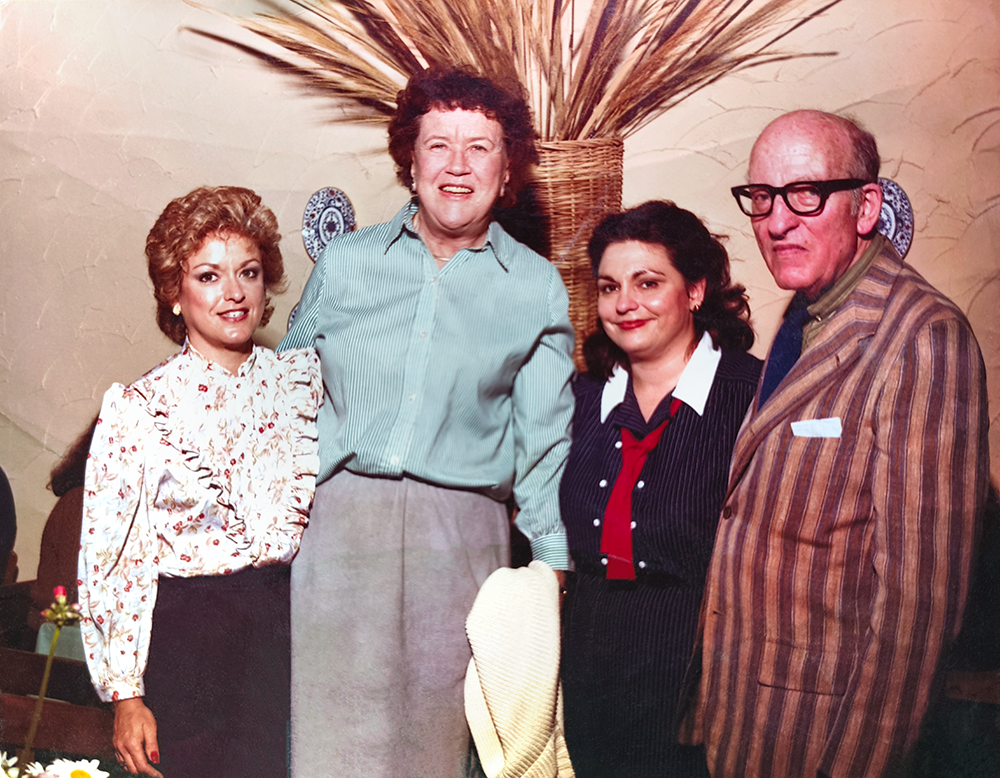
But of all the celebrities she’s cooked for, noted chef Julia Child stands out the most. “That was really the highlight in my culinary life,” she says. “Julia Child and Jacques Pépin, all those people taught me everything.”
Barnes “watched every episode” of Child’s The French Chef TV show. And at one time or another she made “every recipe” in her Mastering the Art of French Cooking cookbook.”
“Cooking is just magical. And what she taught me is it’s not always going to come out right. So just be fearless. And do it again until you get it right.”
She told Child, “I’ve been looking forward to meeting you. And I heard you make a good chicken salad.”
For the luncheon, Barnes prepared stuffed eggplant, tomato aspic, fresh fruit, and quiche, but she also made her chicken salad, which impressed Child. “She pointed to the chicken salad and said, ‘Now, that’s a chicken salad.’ It wasn’t all chock-full of grapes and stuff. It had poached chicken, a few crunchy greens like celery in it, and our homemade mayonnaise dressing. She appreciated the simplicity of it. And said so.
“No president, no queen from Egypt, or any of the top dignitaries could compare with me getting to serve lunch to Julia Child. ‘Am I in a movie? Is this real?’ But this is too real. She was as down-to-earth as you could imagine.”
Barnes gave Child some leftovers to take with her. “We wrapped some rolls and muffins in Saran wrap.”
Four Weddings
Finally, there was the memorable “Four Weddings and a Funeral” day in Clarksdale, Mississippi.
She catered three weddings that day and was turning into the driveway at a home, where the fourth wedding was to take place. “A woman came out frantically waving her arms. Kind of hysterical. I said, ‘We’re just coming to unload.’ And trying to keep her calm, I said, ‘I’ll move the truck.’ She said, ‘No, no, no! She’s dead!’”
Barnes said, “I’m so sorry. How awful. The bride?’ She said, ‘No, no. Her mother.’ I said, ‘Oh, dear.’”
Barnes was backing up the truck when another woman came out and said, “We have people from all over the world here, a lot of people from Germany and France. We are moving to the Bottle Tree Bakery and we are calling it a ‘wake’ or a ‘remembrance.’”
She ended up unloading the van “and had it all set up before the guests arrived. Put the wedding food all along the bar. All the finery, all the silver. It was unbelievable when it was happening.”
As for the couple who was going to say their vows, Barnes says, “They did not get married then, but I understand they got married the next day.”
So, technically, she says, “I guess we couldn’t count that as a wedding.”
Cooking With Purpose
Barnes doesn’t just cook for the rich and famous. “It’s never just been about the food. It’s been about the people and participating in this wild adventure.”
They had a strategy worked out for people who couldn’t afford to eat at Just for Lunch in Chickasaw Oaks. “If someone walked in and asked, ‘How much does lunch cost?’ we’d pretend they had won a contest.”
She would tell the head waiter that this person had just won that day’s contest. As the “winner,” they were treated to a free lunch. And they were treated “like they were the finest diner. I’m as proud of that as feeding the Queen of England.”
Barnes is also part of the Project Green Fork food rescue, where she gives leftover food to Church of the Holy Communion, which repackages it immediately for people who are hungry. “There are so many ways to not waste food and let people who need it, have it.”
And she’s now part of The SOW Project with chefs Ben Vaughn and David Krog. “[It’s] a completely free culinary program to teach disadvantaged people the hospitality business.”
Barnes hired one of her friends, retired restaurateur and consultant Mac Edwards, to be the manager at Just For Lunch in the ’80s. “She is one of my mentors and has always made herself available for advice and counseling,” Edwards says. “The only reason she has not had more public recognition is because she is so humble and just goes about her business of throwing great events. Ann deserves to be considered in the same light as any other prominent Memphis restaurateur or caterer over the last 50 years.”
No matter who she’s cooking for, that person stands out, Barnes says. She likes to say, “My next bride is my next most important customer.”
And she will treat her like she’s the most important customer she’s ever had.



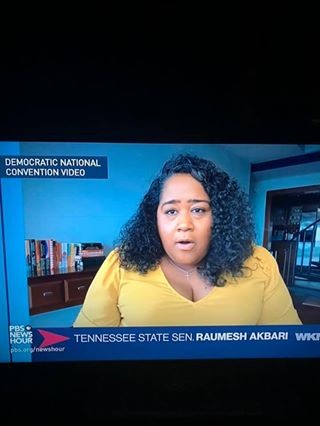


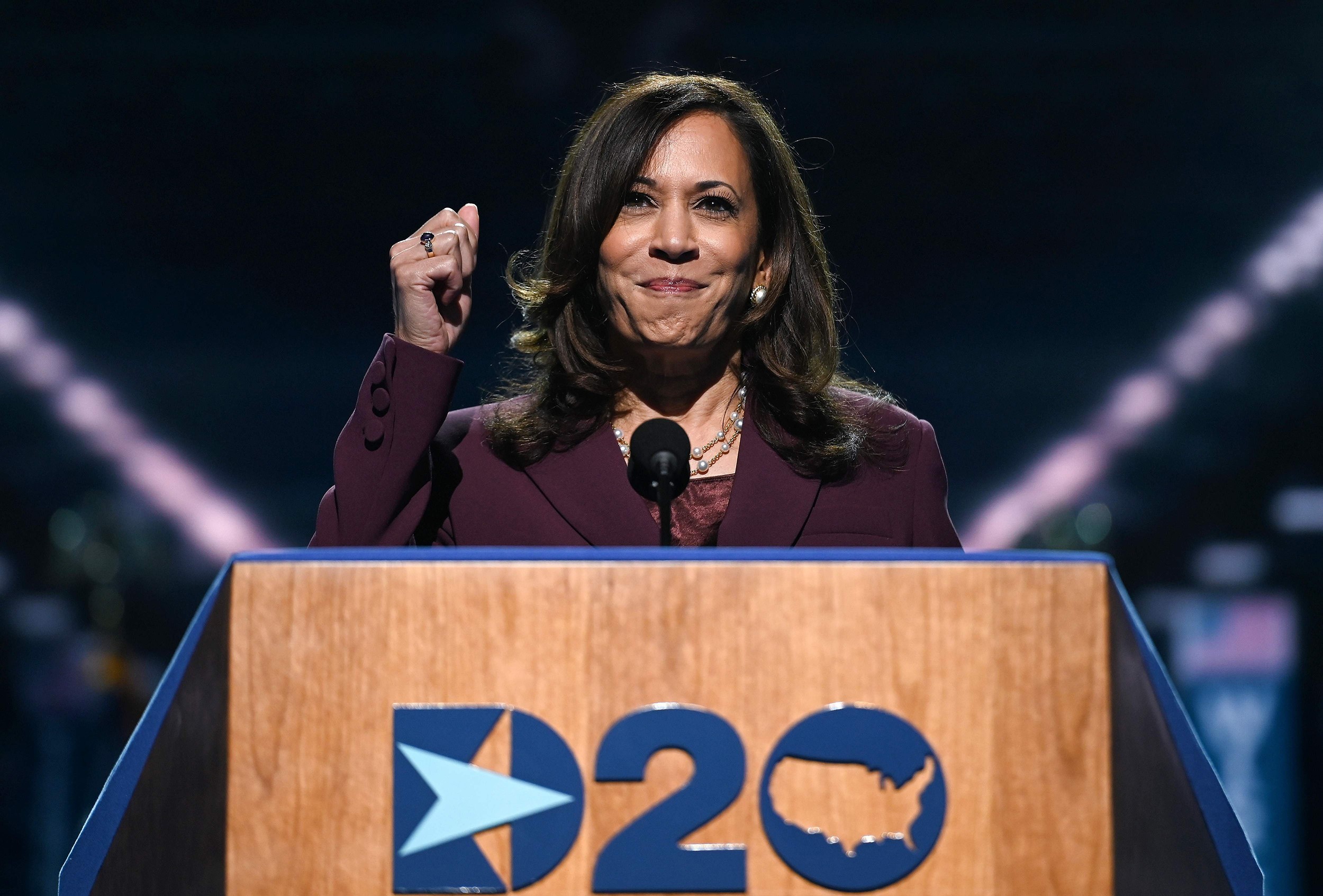





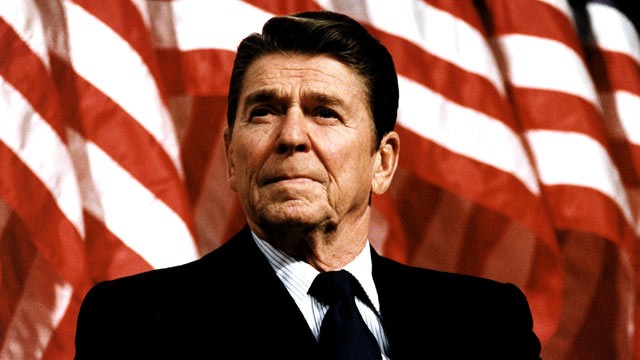

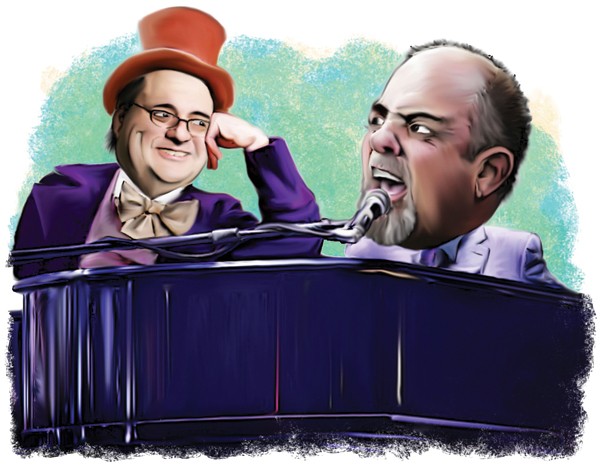 Greg Cravens
Greg Cravens 